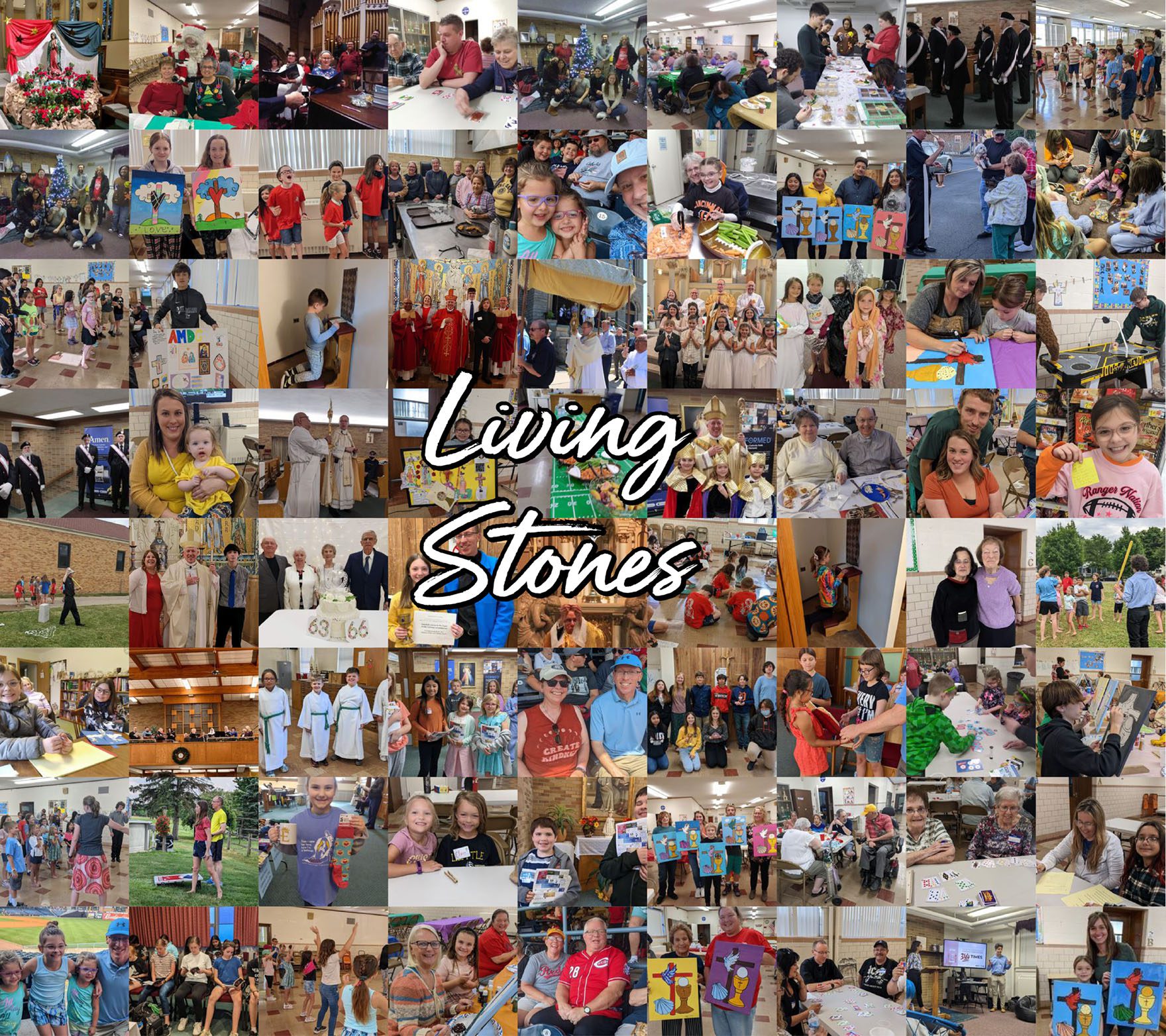
The Most Holy Body & Blood of Christ
To All The Families of the Eucharistic Lord
Corpus Christi Sunday: The Most Holy Body and Blood of Christ
Corpus Christi: Love Made Bread From Need to Gift—The Eucharist as the Metaphysics of Communion
(Week 12 in Ordinary Time: Luke 9: 11b-17, 22 June 2025)
Today, the Solemnity of the Most Holy Body and Blood of Christ is being celebrated in Italy and in other countries. Instituted during the Last Supper, the Eucharist was like the destination of a journey in which Jesus had prefigured it through several signs, above all the multiplication of the loaves narrated in the Gospel of today’s Liturgy (See Luke 9:11b-17). Jesus takes care of the huge crowd that had followed him to listen to his word and to be freed from various evils. He blesses five loaves and two fish, breaks them, the disciples distribute them, and they all ate and were satisfied (Luke 9:17), the Gospel says. In the Eucharist, everyone can experience this loving and concrete attention of the Lord. Those who receive the Body and Blood of Christ with faith not only eat, but are satisfied. To eat and to be satisfied: these are two basic necessities that are fulfilled in the Eucharist. (Pope Francis, Angelus, 2022)
Dear Brothers and Sisters of the Eucharistic Lord
On this Solemnity of Corpus Christi, we stand before one of the most astonishing truths of our faith: that God, who is infinite Being, chooses to become consumable, perishable, edible—Bread for the life of the world. In today’s Gospel, Jesus does not only perform a miracle of abundance; He reveals a metaphysical pattern at the heart of divine reality: that to be is to give, and to live is to be received.
The Gospel of Luke recounts that when the crowd followed Jesus, He welcomed them, spoke to them of the Kingdom, and healed those who needed to be cured. Then, as the day drew to a close and hunger set in, Jesus fed them with five loaves and two fish—and they all ate and were satisfied.
At a glance, this is a story of provision. But beneath the surface, this event prefigures the Eucharist and invites us to reflect on the very structure of being, love, and human fulfillment.
The Human Condition: From Lack to Longing
Philosophically, the human person is a creature of need and desire. We are finite beings who are aware of our finitude. Hunger—whether physical, emotional, or spiritual—is not merely a deficiency but a pointer to transcendence. As Plato taught, eros—our longing—is not weakness but dynamism. It propels us beyond ourselves.
The crowd in the Gospel is not just physically hungry. Their deeper hunger is for meaning, healing, wholeness. Christ does not send them away. He welcomes their need and enters into it. The Eucharist is God’s definitive answer to our deepest hunger—not just for sustenance, but for communion.
You Give Them Something to Eat: The Ontology of Participation
Jesus’ command to His disciples—You give them something to eat—is not rhetorical. It reveals a profound truth: that divine action does not bypass human agency but perfects it.
This is the mystery of participation. The disciples, in their insufficiency, are drawn into a divine economy of gift. Their five loaves and two fish, insignificant in themselves, become instruments of superabundance when offered in trust.
Here, we glimpse a Eucharistic principle: God transforms what we offer, not by overriding it, but by elevating it. In Aristotelian terms, grace does not destroy nature; it fulfills it. In Eucharistic terms, bread and wine remain in appearance, but their substance is transfigured—from elements of the earth into the Body and Blood of Christ.
The Eucharist: Substance, Presence, and Self-Gift
In this miracle, the Church has always seen a prefiguration of the Eucharist. What takes place at every Mass is not a metaphor or symbol, but a metaphysical change—what St. Thomas Aquinas called transubstantio (Transubstantiation): the substance of bread and wine becomes the very substance of Christ Himself.
This means that at the heart of the Eucharist is the mystery of presence. The same Christ who fed the crowds is present on our altars—not imaginatively, but really. And this presence is not inert; it is relational, invitational, and transformative.
The Eucharist thus offers a philosophical correction to a culture of consumption. In our world, to consume often means to dominate or use. But in the Eucharist, to consume is to enter into communion. To receive the Body of Christ is to be drawn into a new mode of being: a life no longer defined by possession, but by self-gift.
From Consumption to Communion: The Sacrament of Personhood
This miracle also reveals the logic of gift, which is central to Christian anthropology. As Pope St. John Paul II often emphasized, the human person finds himself only through a sincere gift of self. The Eucharist is not only the source of grace; it is also the school of personhood.
In it, Christ gives Himself totally and unconditionally. We, in turn, are invited to become what we receive—to become persons formed by love, emptied of ego, and open to the Other.
The twelve baskets left over are not mere leftovers. They are a sign of plenitude, a symbol of the Church’s mission to carry what it has received to the ends of the earth. The Eucharist is never a private experience. It is ecclesial, missionary, communitarian and cosmic.
Conclusion: To Receive is to Be Sent
Dear Epiphany, the miracle in today’s Gospel is not a nostalgic memory; it is a foreshadowing of what happens at every Eucharist. Christ still sees the crowd. Christ still feeds us. Christ still sends us with the words: You give them something to eat. To celebrate Corpus Christi is to affirm that the deepest reality in the universe is not matter, nor energy, nor chaos—but communion, the eternal self-giving love of God poured into the fragile forms of bread and wine, and from there into us.
Let us then approach the Altar not merely as recipients, but as participants in the divine life. Let us allow the Eucharist to reorder our desires, deepen our self-understanding, and commission our lives. For in this sacrament, we do not merely consume Christ—we become what we receive, and in doing so, we enter into the very logic of love. Pope Benedict XVI writes: The Eucharist is the sacrament of the Passover of Christ, the making present of the mystery of the Cross. Every time we celebrate the Mass, heaven and earth meet. We are not just remembering Jesus; we are entering into His Paschal Mystery. The Altar is not merely a Table—it is also the Cross.
Dearly beloved Epiphany, let us then come to the Altar today not as spectators, but as those seen, fed, and sent. Let us bring our hunger, our littleness, our weariness. And let us leave transformed—to give what we have received, and to be what we have consumed (St. Augustine of Hippo).
Jesus in the Eucharist is the very center and heart of our Church, the center and heart of our faith. May Jesus in the Eucharist be the center and heart of our parish, and the center and heart of the lives of each of us. Let us recite the following prayer every when we are in Adoration before the Blessed Sacrament:
O Sacrament most holy,
O Sacrament divine,
All praise and all thanksgiving,
Be every moment Thine.
Fraternally
Fr. John Peter Lazaar SAC, Pastor








